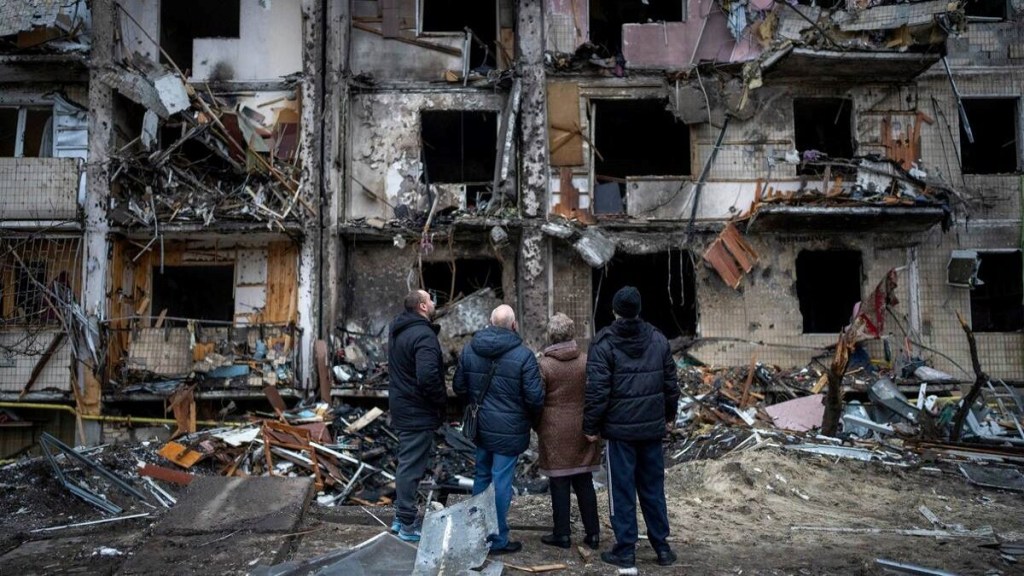By N Chandra Mohan,
Prospects for a cessation of hostilities look bleak for the two and a half years’ war between Russia and Ukraine and the 10-month-long battle between Israeli forces and Hamas in Gaza. They are perhaps two of the most consequential conflicts — of the 56 currently going on with 92 countries involved outside their borders according to the Global Peace Index — that adversely impact the world economy. Due to the Ukraine war, energy prices skyrocketed to $140 a barrel before falling to current levels of $77 a barrel, besides unleashing a global food crisis. The Gaza war threatens to escalate beyond Israel to Lebanon and ultimately involving Iran, engulfing oil-producing West Asia, which can plunge the world economy into stagflation as in the 1970s.
Wars do not end unless the parties involved feel the need to silence their guns as they cannot achieve their military objectives. Alas, this does not seem to be the case at present. Since early August, Ukraine launched a stunning push into Russia’s Kursk region and seized 1,250 sq km of territory, more than Russia has in Ukraine all year. Russia is registering significant gains in Ukraine’s eastern region. Ukraine’s President Volodymyr Zelenskyy is now pressing the US and allies to ease restrictions on the use of western weapons to strike deep into Russian territory. Israel’s PM Benjamin Netanyahu has vowed to continue the battle in Gaza till Hamas is “totally destroyed” and has opened a new front with military operations in the occupied West Bank.
In this milieu, there are objective limits to any mediation efforts as India discovered after it offered to play the role of a peacemaker when Prime Minister Narendra Modi visited Kyiv. India has consistently taken the position of not joining the chorus of western nations in condemning Moscow’s invasion, while appealing for diplomacy and dialogue. Zelenskyy welcomed this stance and even suggested a peace summit in India, but added a caveat that it would not be appropriate to host it in a country that hasn’t endorsed the joint communiqué of the first peace summit in Switzerland. Kremlin’s spokesman, too, appreciated India’s efforts but stated that it was “more than obvious” that there was no basis for talks right now.
The US, too, is painfully aware of its limited success in securing a ceasefire in Gaza despite offering a three-phase proposal in May. When asked if Netanyahu was doing enough to reach a deal, US President Joseph Biden said “no”. Israel’s PM, whose political survival crucially depends on the support of ultranationalist and religious extremist groups who want the war to continue, has added fresh conditions — like retaining troops in the Philadelphi Corridor between Egypt and the Gaza Strip — that scupper any deal. A frustrated US is now set to present a “take it or leave it” proposal. A few of the six slain Israeli hostages were in fact set to be released if the ceasefire kicked in, triggering massive protests in Tel Aviv. But Netanyahu is undeterred.
The problematic nature of peacemaking stems in good part also from how the warring parties perceive the interlocutors. India is not considered a neutral party by Ukraine with Zelenskyy expressing disappointment with Modi’s trip to Moscow in July, which unfortunately coincided with a Russian missile strike on a children’s hospital in Kyiv. Ukraine is aware of India’s delicate balancing act with the West, especially the US, even as it bolsters a strategic relationship with Russia in a multi-polar world. The US, too, is not exactly a disinterested peacemaker in the Gaza conflict or the West Asian region given its iron-clad commitment to support Israel’s right to defend itself by providing billions of dollars of weaponry.
For such reasons, Zelenskyy asked India to stop its balancing act and come on the side of peace, adding that if it stopped purchasing Russian oil President Vladimir Putin will have huge challenges in running a war economy. That if India changes its attitude to Russia, the war will end. The Gaza war also could have ended earlier if the US used its considerable leverage over Tel Aviv to implement its ceasefire proposal. Taking its support for granted, Israel instead has violated every red line that the US indicated — like desisting from invading Rafah — to minimise civilian casualties. Netanyahu is biding his time hoping that Donald Trump, who is much more favourable to Israel, would win in the US presidential elections.
Clearly, there is a long road ahead for both these important conflicts to wind to a conclusion. Ukraine is unfazed by the barrage of Russian missile strikes on its cities as it is emboldened by seizing Russian territory, which will be a valuable bargaining chip if and when both the warring parties smoke the peace pipe. Gaza has been reduced to a dystopian, rubble-strewn wasteland as the war has killed more than 40,000 Palestinians and threatens full-blown famine conditions. The only silver lining is a temporary pause to allow polio vaccination for Gazan children. The elusive peacemaking efforts to end these ongoing conflicts — amidst signs of dangerous escalation — do not bode well for the world economy.
The writer is an economics and business commentator based in New Delhi.
Disclaimer: Views expressed are personal and do not reflect the official position or policy of Financial Express Online. Reproducing this content without permission is prohibited.

